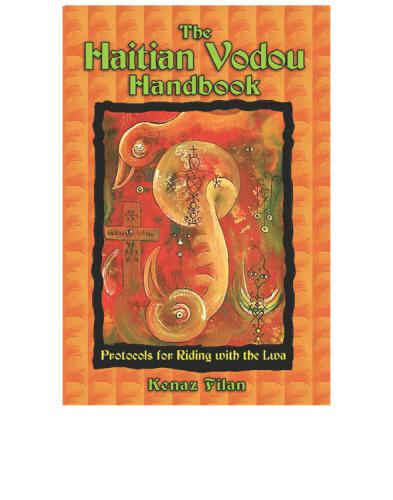
The Haitian Vodou Handbook
Protocols for Riding with the Lwa
کتاب های مرتبط
- اطلاعات
- نقد و بررسی
- دیدگاه کاربران
نقد و بررسی

November 13, 2006
Vodou is not what most people think. It's not "devil worship, dark curses, and drumbeat-driven orgies performed at midnight," poking needles at dolls or simple superstition. With over a decade of service to the lwa (the deities of Vodou) and membership in Societé la Belle Venus #2, a Vodou temple in Brooklyn, Filan sets out to right these pulpy perspectives of what in reality is a complex African diaspora spirituality and a form of worship that marries the secular and the spiritual. Of course, Vodou is not without its dangers, since "the lwa can wreak a frightening vengeance." It's not foolproof, either; without proper initiation into addressing the lwa, they will simply ignore you. But Filan aspires to give potential initiates the proper tools for communicating with the deities of Vodou (like Mama Danto, who protects, and Papa Damballah, who brings peace). In the process, he shares the rich and at times disturbing history of its practitioners (especially the oppression and racism faced during slavery) and offers a litany of everything necessary to practice Vodou on an individual level, from knowledge of the tradition's most important symbols, rites, myths and spells to an extensive list of further resources and Vodou-related Web sites, music and even charities.

December 1, 2006
Vodou (as Filan prefers spelling " voodoo" ) is more misunderstood than appreciated in contemporary America, but Filan does an excellent job of presenting his religion to the lay reader. Although written especially for those who hope to practice vodou, the book is also a good introduction for armchair " hougons" and " mambos" (male and female celebrants). Start, Filan advises, by understanding the social reality in which vodou arose. In chapters of excellent, readable history, he describes the slave trade and the bloody slave revolts that led to the eventual establishment of today's Haiti. He doesn't flinch from describing the vodou connections of the frightful Tonton Makout, "Papa Doc" Duvalier's personal militia, nor does he pretend that vodou is invariably a route to peace and harmony. Like any religion, it can be employed negatively, too. After his comprehensive introduction, Filan goes into some of the major " lwas" (roughly translated, "gods and goddesses," but " lwas" could also be considered to indicate saints, though never human saints) that a practitioner might encounter. A good, respectful resource. (Reprinted with permission of Booklist, copyright 2006, American Library Association.)

























دیدگاه کاربران